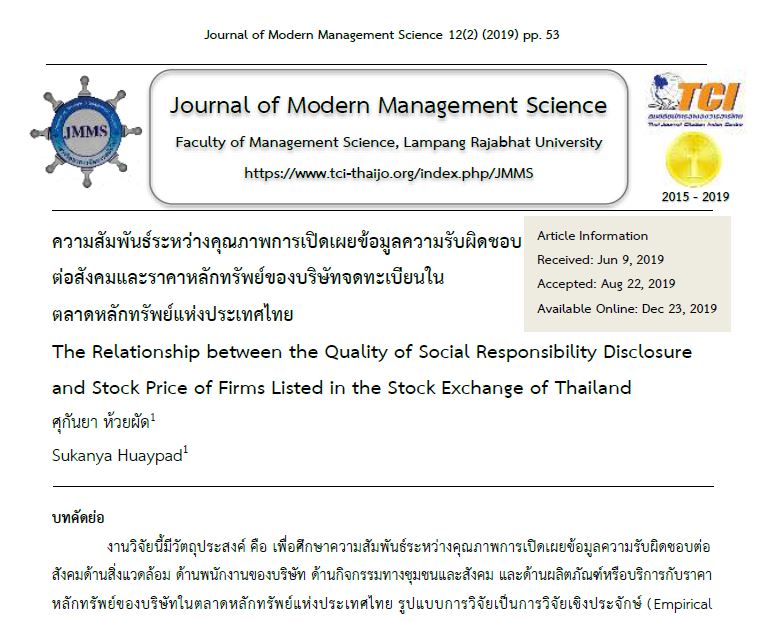The Relationship between the Quality of Social Responsibility Disclosure and Stock Price of Firms Listed in the Stock Exchange of Thailand
Main Article Content
Abstract
The objectives of this research were to investigate the quality of social responsibility disclosure of firms listed in the Stock Exchange of Thailand and to study stock price relationship with the quality of social responsibility disclosure; environment, employees, social and community activities, and product or service direction of firms listed in the Stock Exchange of Thailand. The sample was 385 firms listed in the Stock Exchange of Thailand in year 2015. The statistical analysis was Multiple Regression. Data of the quality of social responsibility disclosure was collected by working papers developed from literature reviews and Global Reporting Initiative framework. The results can be found that the quality of product or service responsibility direction disclosure has a positive and significant association with stock price. The quality of social and community activities responsibility direction disclosure has a negative and significant association with stock price. Other variables consisting of the quality of environment and employees responsibility direction disclosure are not significantly associated with stock price.
Article Details
The article must be considered and accepted for publication by the editorial board of the Faculty of Management Science, Lampang Rajabhat University. The articles have been reviewed by a peer (peer review) and the author must update according to the suggestion if available before publication. Articles that are not considered the editorial team will inform the results of the consideration but will not send the original to the author.
JMMS is the Faculty of Management Science journal, Lampang Rajabhat University. Jmms published both print and online editions. We allow the use of articles for academic use under the scope of copyright law.
References
กัลยา วานิชย์บัญชา. (2546). การวิเคราะห์สถิติเพื่อธุรกิจ: สถิติเพื่อการตัดสินใจทางธุรกิจ. (พิมพ์ครั้งที่ 7). กรุงเทพฯ: โรงพิมพ์แห่งจุฬาลงกรณ์มหาวิทยา.
ขวัญนภา เศิกศิริ, สมใจ บุญหมื่นไวย และ ธนภณ วิมูลอาจ. (2561). อิทธิพลของอัตราส่วนทางการเงินต่อราคาตลาดหลักทรัพย์ของบริษัทจดทะเบียนในตลาดหลักทรัพย์แห่งประเทศไทย: กรณีศึกษากลุ่มอุตสาหกรรมบริการ. วารสารชุมชนวิจัย. 12(2) (น.71-84).
ขวัญฤทัย บุญถึง และจินดา ขันทอง. (2555). ปัจจัยที่มีอิทธิพลต่อราคาหลักทรัพย์ของบริษัทจดทะเบียนในตลาดหลักทรัพย์แห่งประเทศไทย: กรณีศึกษาอุตสาหกรรมอสังหาริมทรัพย์และก่อสร้าง. รายงานการประชุมทางวิชาการของมหาวิทยาลัยเกษตรศาสตร์ ครั้งที่ 50 (สาขาเศรษฐศาสตร์และบริหารธุรกิจ) (น. 319-327). กรุงเทพฯ: มหาวิทยาลัยเกษตรศาสตร์.
จรรยวรรณ จิตวรพันธ์. มูลค่าเพิ่มทางเศรษฐศาสตร์ มูลค่าตลาดเพิ่ม อัตราส่วนทางบัญชี และผลตอบแทนของหุ้นสามัญ: การศึกษาจากประเทศไทย. (วิทยานิพนธ์ปริญญามหาบัณฑิต, จุฬาลงกรณ์มหาวิทยาลัย).
ฑริยา พงษ์พันธุ์. ความสัมพันธ์ระหว่างระดับการเปิดเผยข้อมูลความรับผิดชอบด้านสิ่งแวดล้อม สังคมและบรรษัทภิบาลขององค์กรกับผลประกอบการทางการเงินของบริษัทหมวดธุรกิจพลังงานที่อยู่ในดัชนี SET 50.
(วิทยานิพนธ์ปริญญามหาบัณฑิต, มหาวิทยาลัยธุรกิจบัณฑิตย์).
นิ่มนวล เขียวรัตน์. (2539). ผลกระทบของประกาศกำไรสุทธิทางบัญชีต่อราคาหลักทรัพย์ของบริษัทจดทะเบียนตลาดหลักทรัพย์แห่งประเทศไทย: กรณีความแตกต่างในความพร้อมของข้อมูล. (วิทยานิพนธ์ปริญญามหาบัณฑิต, จุฬาลงกรณ์มหาวิทยาลัย).
มูลนิธิสถาบันไทยพัฒน์. (2559). ซีเอสอาร์คืออะไร. รู้จักซีเอสอาร์. สืบค้น 25 กันยายน 2559, จากhttps://www.thaicsr.com/2006/03/blog-post_20.html
วรรณชา กาญจนมุสิก. (2554). การทำกิจกรรมความรับผิดชอบต่อสังคม (CSR) ที่มีผลต่อการตัดสินใจเลือกซื้อสินค้าและบริการของผู้บริโภคในเขตกรุงเทพมหานคร. (วิทยานิพนธ์ปริญญามหาบัณฑิต, มหาวิทยาลัยกรุงเทพ).
วิเชษฐ์ โรจนสุกาญจน และ ศิลปะพร ศรีจั่นเพชร. (2548). การบัญชีเพื่อความรับผิดชอบต่อสังคม: มิติใหม่ในการกำกับดูแลกิจการ. การกำกับดูแลกิจการที่ดี: Corporate Governance. (น. 121). กรุงเทพฯ: มหาวิทยาลัยธรรมศาสตร์.
ศูนย์วิจัยมหาวิทยาลัยธุรกิจบัณฑิต. (2548). การสำรวจพฤติกรรม ทัศนคติของผู้บริโภคเกี่ยวกับความรับผิดชอบต่อสังคมขององค์กรการธุรกิจในประเทศไทย. กรุงเทพฯ: มหาวิทยาลัยธุรกิจบัณฑิต.
สุมาลี หดคำ. (2559). การศึกษาความสัมพันธ์ระหว่างระดับการเปิดเผยรายงานความยั่งยืนกับราคาหลักทรัพย์ของบริษัทจดทะเบียนในตลาดหลักทรัพย์แห่งประเทศไทย. (วิทยานิพนธ์ปริญญามหาบัณฑิต, มหาวิทยาลัยบูรพา).
อาณัติ ลีมัคเดช. (2556). การส่งสัญญาณด้วยรางวัลรับผิดชอบต่อสังคม: กรณีศึกษาของบริษัทจดทะเบียนในตลาดหลักทรัพย์แห่งประเทศไทย. วารสารบริหารธุรกิจ, 36(139), 27-42.
Anderson, D. R., Sweeney, D. J., & Williams, T. A. (2002). Statistics for Business and Economics (8th ed.,
pp. 634). R. R.Donnelley & Sons, United States of America.
Allen, G., & S. Kask. (1997). Socially Responsible Firms: Financial and Market Performance. Journal of Business and Economic Perspectives, 23(2), 86-96.
Balabanis, G., Phillips, C., & Lyall, J. (1998). Corporate Social Responsibility and Economic Performance in the Top British Companies: Are They Linked? European Business Review, 98, 25–44.
Caroline, F. (2012). Corporate Social Responsibility and Stock Prices: The Environmental Awareness of Shareholders. Retrieved December 11, 2016, from https://corporate-sustainability.org/wp-content/uploads/arcs-2012-Flammer.pdf
Chen, G., Firth, M., Gao, N., & Rui, M. (2006). Ownership Structure, Corporate Governance, and Fraud: Evidence from China. Journal of Corporate Finance, 12(3), 424 – 448.
Donaldson, T., & Preston, E. (1995). The Stakeholder Theory of the Corporation: Concepts, Evidence, and Implications. Academy of Management Review, 20(1), 65-91.
Francesca, D., & Maria, I. (2014). The Relationship between Corporate Social Responsibility and Stock Price: An Analysis of the Italian Listed Companies. Retrieved December 11, 2016, from https://www.researchgate.net/publication/228121159_The_Relation_between_Corporate_Social_Responsibility_and_Stock_Prices_An_Analysis_of_the_Italian_Listed_Companies.
Global Reporting Initiative. (2007). Sustainability Reporting Guidelines. Retrieved September 25, 2016, from https://www.globalreporting.org/
Gray, R., Owen, L., & Adams, C. (1996). Accounting and Accountability: Changes and Challenges in Corporate and Social Reporting. London: Prentice-Hall Europe.
Kotter, J., & Heskett, T. (1992). Corporate Culture and Performance. Social Responsibility Journal, 8(2), 186-198.
Lee S., & Lynn S. (1975). Social Accounting: Theory, Issues and Case. Journal of Social Policy, 6(3), 365-366.
Lehtonen, J. (2003). Legitimacy theory. Retrieved October 18, 2016, from https://www.jyu.fi/viest/verkkotuotanto/yviperust/termikirjasto/legitimacy_theory.html.
Meir, S. (2005). Socially Responsible Indexes: Composition, Performance and Tracking Errors. Journal of Portfolio Management, 23(3), 100-109.
Ming-Te, L. (2016). Corporate Social Responsibility and Stock Price Crash Risk: Evidence from an Asian Emerging Market. Managerial Finance, 42(10), 963-976.
Parsa, S., & Kouhy, R. (2001). Disclosure of Social Information by UK Companies. A Case of Legitimacy Theory. Retrieved January 8, 2017, from https://mubs.mdx.ac.uk/Research/Discussion_Paper/Accounting_and_Finance/dpapa&fno16.pdf
Kim, Y., Li, H., & Li, S. (2014). Corporate Social Responsibility and Stock Price Crash Risk. Journal of Banking and Finance, 43(6), 1-13.


